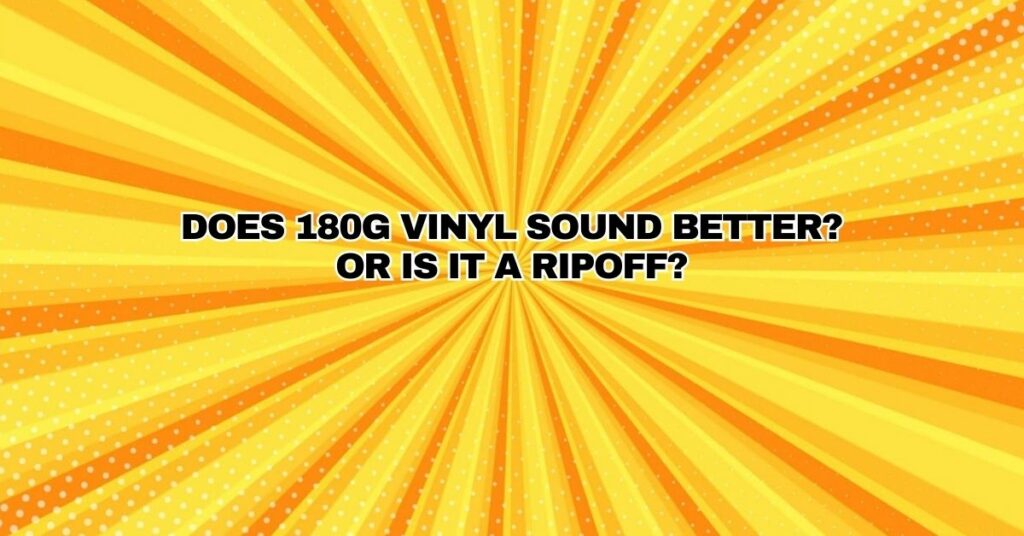In the world of vinyl records, the choice between standard-weight and heavyweight vinyl has become a point of contention and curiosity among audiophiles and music enthusiasts. The question at the heart of the debate is whether 180g vinyl records genuinely sound better or if they’re merely a marketing gimmick. In this comprehensive article, we’ll delve into the intricacies of vinyl records, the factors influencing sound quality, and the debate surrounding the audio quality of 180g vinyl.
Understanding Vinyl Records
To begin our exploration, it’s essential to grasp the fundamental components of vinyl records. A vinyl record is a flat, circular disc made from polyvinyl chloride (PVC). Music is stored in the form of grooves etched into the record’s surface. When a turntable’s stylus or needle traverses these grooves, it translates the physical vibrations into audible sound, delivering a unique, analog listening experience.
The appeal of vinyl records lies in their warm, analog sound, marked by rich tonal qualities, a broad dynamic range, and the charming imperfections that give vinyl its unique character.
The Quest for Sound Quality
Audiophiles, music collectors, and enthusiasts are often on a perpetual quest for superior sound quality. Vinyl records, with their analog nature, offer an attractive alternative to digital audio, with a sonic richness that appeals to many.
The sound quality of a vinyl record is influenced by a multitude of factors, and the weight of the vinyl itself is just one piece of the puzzle.
The Weighty Debate: 180g Vinyl vs. Standard Weight
The choice between 180g vinyl and standard-weight vinyl, usually around 120-140g, hinges on multiple considerations:
- Durability: One of the primary benefits of 180g vinyl is enhanced durability. The additional thickness and weight make these records less prone to warping, and they can withstand fluctuations in temperature and humidity more effectively.
- Stability: Heavier vinyl records offer a more stable platform for the grooves. This reduces the risk of vibrations and resonances that can compromise sound quality.
- Sound Quality: The thickness and weight of the vinyl record can influence sound quality. Thicker, heavier vinyl is less susceptible to surface noise, such as pops and crackles, commonly associated with vinyl playback. The added mass can also assist in maintaining consistent playback speed.
- Collectibility: Heavier vinyl records are often associated with special editions, reissues, and audiophile releases, signifying an emphasis on quality. These records are attractive to collectors and may feature more luxurious packaging.
Factors Beyond Vinyl Weight
While the weight of the vinyl record is a substantial factor, it’s crucial to recognize that other elements contribute to sound quality:
- Mastering and Pressing Quality: The quality of mastering and pressing plays a pivotal role. A well-mastered and well-pressed standard-weight vinyl record can deliver excellent sound quality, provided attention to detail is maintained.
- Playback Equipment: The quality of the turntable, cartridge, and stylus has a significant impact. High-quality components can extract more detail from the vinyl grooves, ensuring optimal playback.
- Source Material: The original source of the music is crucial. If the source was digital, it might introduce digital traits to the sound. Analog sources can preserve a warmer and more organic sound.
The Audiophile Dilemma
The quest for the perfect sound in the audiophile world often leads to debates about vinyl record weight. Some audiophiles believe that 180g vinyl provides a discernible advantage in terms of sound quality, particularly in reducing surface noise. Others maintain that the difference in sound quality between standard-weight and heavyweight vinyl is minimal, and the choice primarily relates to factors such as collectibility and durability.
The truth may lie somewhere in between. While the weight of a vinyl record can indeed contribute to improved sound quality, it is not the sole determinant. The quality of mastering, pressing, playback equipment, and source material all play a substantial role.
In conclusion, the choice between 180g vinyl and standard-weight vinyl records ultimately comes down to individual preferences and priorities. Both formats have their merits and can offer exceptional sound quality when handled and played with care. The love for vinyl records transcends the weight of the record, focusing on the analog experience and the timeless connection to music that vinyl provides. The pursuit of the perfect sound will continue to be a topic of conversation among audiophiles, ensuring that vinyl remains at the forefront of the music-listening experience.


